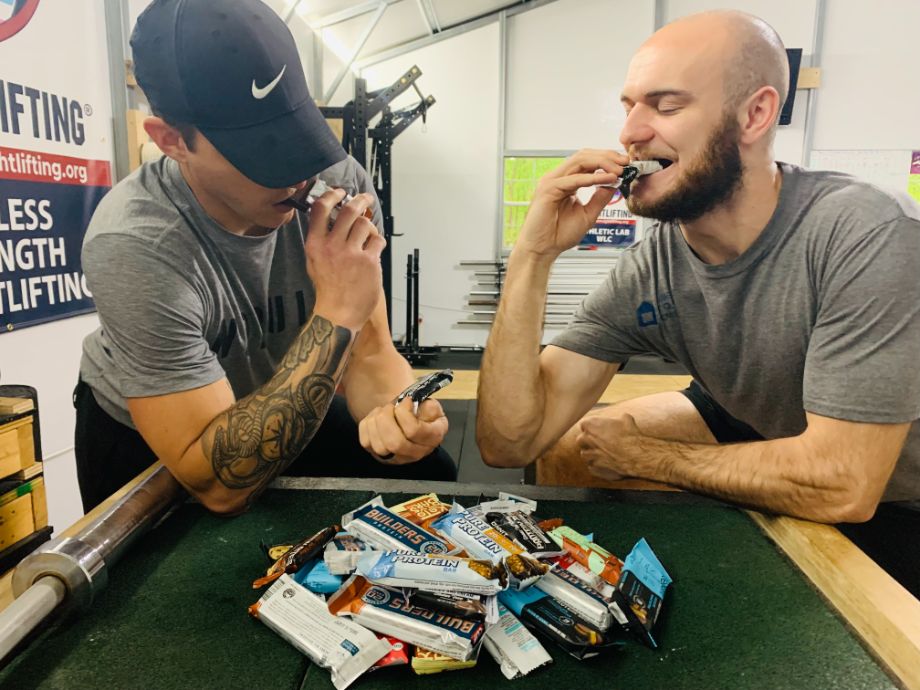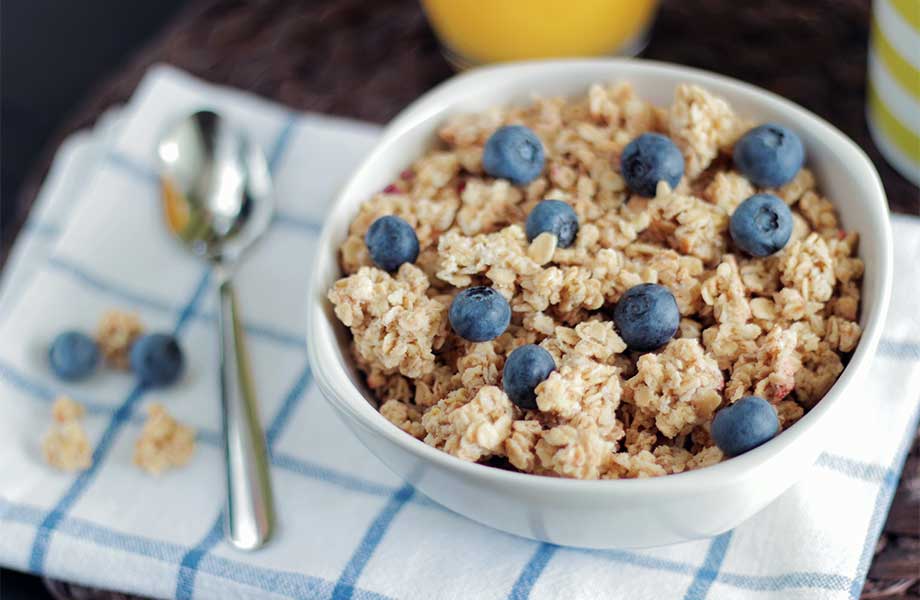We test and review fitness products based on an independent, multi-point methodology. If you use our links to purchase something, we may earn a commission. Read our disclosures.
Pre-workout snacks are widely treated as optional in the fitness space, but in the world of sports dietetics, they are essential. Studies show1 that reported time to exhaustion is significantly reduced when a small snack rich in carbohydrates was consumed before strength training. In my opinion (and according to what I see in the gym, I am in the minority), pre-workout snacks are superior to pre-workout supplements. While the best pre-workout supplements contain ingredients that can be great for an energy boost if that’s what you need, they often offer little nutritional value when compared to food.
However, how are you supposed to know what to eat? All snacks are not created equal and the composition of grams of protein, carbs, and fat is important to get right if you want to reap the benefits. You also want to make sure you time your healthy snack properly, as bad timing can actually worsen your performance. The combo of correct grams of carbs and timing can be the difference between an OK workout and a great one.
So, your friendly neighborhood RDN and our team of experts at GGR is here to give you the sports nutrition standards used by the most elite athletes that you can apply to your own strength training. I’m excited to share these secrets with you, so let’s get into it!
Medical disclaimer: This article is intended for educational and informational purposes only. It is not intended as a substitute for medical advice. For health advice, contact a licensed healthcare provider.
Should You Eat Before A Workout?
I’ll get straight to the point: You should absolutely eat before you work out. Do you have to? Not really. In fact, some science has shown in the past that working out on an empty stomach can help you burn more fat. However, there are just as many studies that say2 body composition changes are similar between people who fast and people who don’t, so it’s really a matter of preference.
In my opinion, though, your preference should be to have a pre-workout meal and/or snack. While weight loss is cool and all, the effort that you put into your workouts is the most important and eating before a sweat session reduces fatigue and increases power.
More effort = more exertion = more calories burned, which serves to help you lose fat also. Also, eating before a workout minimizes the risk of muscle damage and catabolism. Maintaining our muscle mass should always be a priority when it comes to our fitness.

Eating a healthy snack rich in carbs before a workout also spares glycogen stores. Glycogen is the storage form of glucose, or blood sugar. Basically, it’s like the body’s fuel tank. If you fill it up with carbs, you have more energy to crush your workout. Then, you can think of a pre-workout snack as a gas can to top off the tank. Without your gas can, you may be working out with the tank half full, which isn’t horrible for exercise performance, but it’s not optimal either.
It is also pretty much non-negotiable that you maintain a good level of glycogen in your body if you engage in endurance exercises such as long-distance running, cycling, or swimming. If you run out of fuel long before your activity is complete, your performance is sure to suffer1.
It’s also important to keep glycogen stores full so that you have the energy stored up to proceed with your day after your workout is complete and you’re not feeling dead all day. Even if you work out in the evening, having some glycogen stored up can help your body recover while you’re sleeping. Full glycogen stores3 also keep you ready for optimal performance during your next training bout.
Finally, the most obvious point: eating before a workout reduces hunger. When you’re hungry, it’s likely you won’t be 100% focused on the workout, but thinking about that sweet, sweet Chipotle burrito bowl you’re going to treat yourself to later. This can even lead to you cutting your workout short just so you can go eat.
How Much Should You Eat Before A Workout?
What to Avoid
Before we get into specific amounts of food to eat before a workout, let’s talk about elements to avoid when composing a pre-workout snack. Firstly, it is best to avoid spicy foods since they can cause stomach upset and make it difficult for you to perform well.
I also always tell my athletes that within two hours of training, you should avoid the two “Fs”—fat and fiber. The reason you don’t want these in your pre-workout snack is they tend to slow digestion. This is a problem for two reasons:
One, if you have a bunch of food still jumping around in your stomach while engaging in intense exercise, not only are you going to feel “heavy” or just generally uncomfortable and thus unable to perform at your full potential, but also blood from your muscles ends up getting shuttled to your digestive tract instead, which can also have a negative impact on strength and overall performance.
Two, if digestion and absorption is too slow, your body won’t be able to access the carbohydrates in time to use them as fuel for your workout, making the pre-workout meal or snack pretty much useless at that point.
Finally, I cautiously advise against protein intake pre-workout. I say cautiously because protein pre-workout may help prevent muscle breakdown and some forms of protein powder, like mass gainers, have enough carbs in them to serve as pre-workout nutrition.
RELATED: Best Protein Powder for Weight Gain
However, if you consume too many grams of protein with your pre-workout snack, your digestion will be too slowed for your fuel to be available to you in time for you to actually use it during your workout.
So, if your selected carb snack happens to have protein in it as well (like with a protein bar), try to limit the protein to 15 grams or less. If there are more grams of protein than this, I would consider a different snack.
RELATED: Best Carb Supplement
How Much To Eat
Generally, sports dietitians adhere to sports nutrition guidelines4 that are specific to weight. As a reminder, to find your weight in kilograms, simply divide your weight in pounds by 2.2 and go from there:
- 4 grams/kg of carbohydrates 4 hours before activity
- 3 grams/kg of carbohydrates 3 hours before
- 2 grams/kg of carbohydrates 2 hours before
- 1 grams/kg of carbohydrates 1 hours before
The amount decreases as time for exercise gets closer for reasons we mentioned earlier. While it’s important to fuel up sufficiently, having too much in your stomach while exercising can be counterproductive to performance goals.
You should be having your pre-workout snacks 30 minutes to 2 hours before you work out. So, for someone like me who is 120 pounds, or 54 kilograms, I would want to eat 108 grams of carbs (about 1 bagel and 32 ounces of Gatorade) 2 hours before a workout and 27 grams (about 8 ounces of orange juice) 30 minutes before. Finally, the closer you get to time for activity, the simpler your carbohydrates should be. I’ll talk more about this below:
Best Pre-Workout Snack Ideas
Since a pre-workout snack should be consumed 2 hours or less prior to exercise, we’ll provide optimal snacks within those time frames. However, you should adjust amounts based on your individual body weight. The key is to choose simple carbohydrates that digest quickly, rather than complex carbohydrates like whole-wheat bread, pasta, or oatmeal, to get fuel into your bloodstream as quickly as possible.
Finally, beverages like Gatorade and fruit juice are some of most RDNs’ favorite pre-workout “snacks” despite them not being food. They can both be a great source of electrolytes to keep you hydrated during your workout as fruit juice contains potassium along with antioxidants.

2 Hours Before
- 2 cups of high-sugar cereal with 1 cup of 1% milk
- 1 footlong sub sandwich with minimal veggies and white bread
- 1 bagel with jam, a container of Greek yogurt and 2 fig cookie bars
1 Hour Before
- 2 pieces of fresh fruit or ½ cup dried fruit
- 1 cup low-fat granola
- 2 oz of tortilla chips and ½ cup salsa
30 Minutes Before
- 32 oz of Gatorade (NOT G2 or Zero)
- 8 oz of chocolate milk
- ¾ cup fruit juice (orange, apple, etc.)
In general, I would avoid otherwise-healthy, high-fat foods 2 hours or less before activity. This includes foods like hummus, peanut butter, almond butter, other nut butters, trail mix, or chia seed pudding for reasons we already discussed. These can be consumed during a pre-workout meal, however, which is a meal dietitians recommend be consumed 3-4 hours before competition or exercise.
Best Pre-Workout Snack: Final Thoughts
Healthy eating normally dictates that we steer clear of sugar and refined carbs in favor of foods like whole-grain bread, but these fast-digesting carbohydrates have tremendous performance benefits when timed properly and make for an ideal pre-workout snack. As long as you avoid fiber, fat, and too much protein in your pre-workout snack, your carbs will be able to raise your blood sugar level enough to fuel your performance in the way they are supposed to.
Simply calculate your individual carb needs based on your current body weight, plan the timing of your intake to optimize blood sugar levels of glucose and continue to adhere to healthy eating outside of your pre and post workout nutrition. After all, a terrible diet can do nothing but harm your fitness and performance goals, regardless of what you eat before your workout.
Best Pre-Workout Snack: Q&A
What should I eat 30 minutes before a workout?
Low-fiber, fast-digesting carbohydrates are the best snack to consume before a workout and examples of these include 1 cup of chocolate milk, 1 banana, 1 cup of fruit juice, and ½ a bagel.
What is the best snack to eat before a workout?
The best snack to eat before a workout is one that contains 20 to 40 grams of low-fiber, fast-digesting carbohydrates.
What is the best pre-workout snack for muscle gain?
The best snack before a workout is not a specific snack, but something that is high in fast-digesting carbohydrates and low to moderate in protein to promote a positive protein balance and, in turn, muscle growth.
What is a good protein snack before a workout?
While a high-protein snack is not as beneficial as a high-carb snack before a workout, it can aid in muscle recovery. A good protein snack is one that has a moderate amount of protein (about 10-15 grams), to prevent muscle catabolism, but not enough to slow down the digestion of pre-exercise carbohydrates. This could be 2 eggs, 1 ounce of beef jerky, or 1 cup of nonfat Greek yogurt.
These statements have not been evaluated by the Food and Drug Administration. This product is not intended to diagnose, treat, cure, or prevent any diseases.
References
- Ormsbee MJ, Bach CW, Baur DA. Pre-exercise nutrition: the role of macronutrients, modified starches and supplements on metabolism and endurance performance. Nutrients. 2014;6(5):1782-1808. Published 2014 Apr 29. doi:10.3390/nu6051782
- Schoenfeld BJ, Aragon AA, Wilborn CD, Krieger JW, Sonmez GT. Body composition changes associated with fasted versus non-fasted aerobic exercise. J Int Soc Sports Nutr. 2014;11(1):54. Published 2014 Nov 18. doi:10.1186/s12970-014-0054-7
- Murray B, Rosenbloom C. Fundamentals of glycogen metabolism for coaches and athletes. Nutr Rev. 2018;76(4):243-259. doi:10.1093/nutrit/nuy001
- Ormsbee MJ, Bach CW, Baur DA. Pre-exercise nutrition: the role of macronutrients, modified starches and supplements on metabolism and endurance performance. Nutrients. 2014;6(5):1782-1808. Published 2014 Apr 29. doi:10.3390/nu6051782
Further reading

Two small but mighty fitness trackers go head to head in our Ringconn vs Oura comparison. Read more

In this Bowflex SelectTech 840 Adjustable Kettlebell Review, I’ll give you the 411 on value, durability, weight, and compare it to other popular options. Read more

What are the best shoes for deadlifting? Some people say none, but we’ve compiled six of our top picks that we think get the job done. Read more

The best walking shoes for plantar fasciitis have ample cushioning and the proper support to absorb impact and keep your feet stable. These are our top picks. Read more

